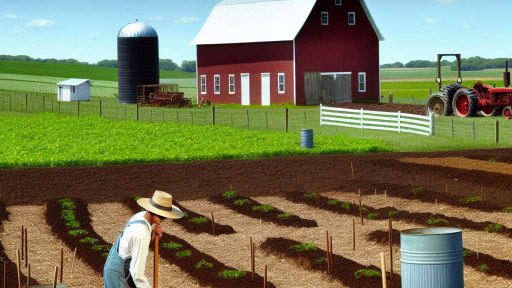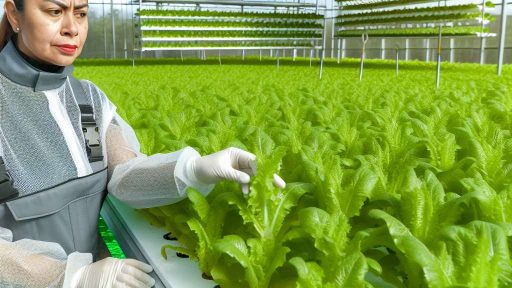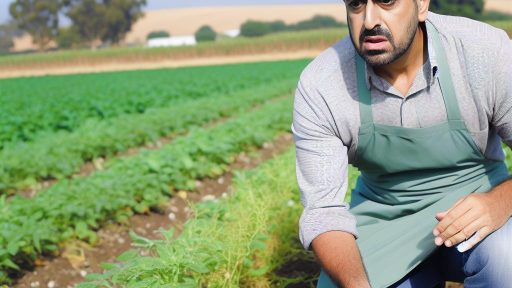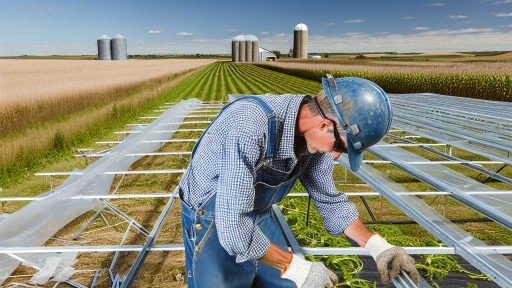Introduction to Precision Agriculture
Precision agriculture plays a crucial role in modern farming.
This approach uses technology to enhance crop management efficiency.
Farmers leverage data to make informed decisions about their fields.
They utilize tools like GPS, sensors, and drones for real-time insights.
Consequently, precision agriculture minimizes resource waste.
It allows for targeted application of water, fertilizers, and pesticides.
Benefits of Precision Agriculture
One significant advantage is improved crop yields.
Farmers can identify variations in soil and plant health.
This targeted approach increases overall productivity.
Additionally, it reduces environmental impact.
Farmers can optimize inputs and minimize runoff.
Enhancing Decision-Making
Data analytics is at the core of precision agriculture.
Farmers can analyze trends over time to adjust their strategies.
This evidence-based decision-making fosters sustainability.
Furthermore, it supports better financial planning.
Transform Your Agribusiness
Unlock your farm's potential with expert advice tailored to your needs. Get actionable steps that drive real results.
Get StartedFarmers can forecast yields and market demand more accurately.
Challenges in Implementation
Despite its benefits, precision agriculture faces challenges.
High initial costs can deter some farm owners.
Moreover, technology requires regular updates and maintenance.
Additionally, not all farmers have adequate training.
Addressing these issues is vital for widespread adoption.
Overview of the Real Estate Sector and Its Intersection with Agricultural Land
Understanding the Real Estate Landscape
The real estate sector plays a crucial role in the economy.
It encompasses residential, commercial, and agricultural properties.
In recent years, the demand for agricultural land has grown significantly.
This shift reflects the increasing importance of food security.
Furthermore, urban expansion drives competition for land use.
Implications for Agricultural Land
Agricultural land faces pressure from various developmental projects.
As populations increase, so does the need for housing and commercial spaces.
This dynamic often leads to changes in land use policies.
Local governments must address these challenges through zoning regulations.
The goal is to balance development needs with agricultural preservation.
Benefits of Integrating Real Estate and Agriculture
Integrating real estate practices with agriculture offers unique advantages.
For instance, precision agriculture technology enhances crop yields.
Moreover, these technologies can optimize land use for real estate developers.
The collaboration can lead to sustainable land management solutions.
Additionally, community gardens and urban farming initiatives boost local economies.
Challenges in Merging Sectors
However, merging these sectors is not without its challenges.
Land valuation discrepancies often arise between agricultural and real estate markets.
Moreover, regulatory frameworks can complicate land use changes.
Showcase Your Farming Business
Publish your professional farming services profile on our blog for a one-time fee of $200 and reach a dedicated audience of farmers and agribusiness owners.
Publish Your ProfileFor instance, navigating environmental concerns requires careful planning.
Lastly, educating stakeholders about potential benefits is crucial.
Technological Advancements in Precision Agriculture
Drones in Crop Management
Drones revolutionize crop management through aerial imagery.
Farmers can monitor crop health efficiently using drone technology.
This technology allows for precise assessments of field conditions.
As a result, it enables targeted interventions for pest control.
Furthermore, drones facilitate data collection on large tracts of land.
Sensors Enhancing Agricultural Efficiency
Sensors play a crucial role in precision agriculture.
Ground sensors measure soil moisture and temperature dynamically.
This data helps farmers make informed irrigation decisions.
Consequently, crops receive the right amount of water.
Moreover, aerial sensors monitor crop growth in real-time.
Data Analytics Transforming Farming Practices
Data analytics improves decision-making in agriculture.
Farmers analyze patterns using collected data for better yield predictions.
The process leads to optimized planting schedules and resource allocation.
As a result, expenses decrease while productivity increases.
Additionally, advanced analytics enables trend forecasting.
Integrating Technology for Better Outcomes
The combination of drones, sensors, and data analytics enhances farming.
Modern tools collaboratively improve crop management efficiency.
Farmers can now maximize their land’s potential effectively.
This integration minimizes waste and resource use.
Ultimately, it promotes sustainable agricultural practices.
Discover More: Greenhouse Cultivation for Real Estate Investors
The Economic Benefits of Integrating Precision Agriculture with Real Estate Development
Enhanced Property Value
Utilizing precision agriculture can significantly boost property value.
Investors recognize the importance of sustainable practices.
Precision techniques often lead to more productive land use.
This attracts higher offers in real estate markets.
Reduced Operational Costs
Integrating precision technology streamlines farming operations.
Farmers can save on inputs like seeds and fertilizers.
Efficient resource use leads to lower overall costs.
Additionally, improved yield forecasts promote better financial planning.
Increased Investment Opportunities
The merger of agriculture and real estate opens new investment avenues.
Investors increasingly seek sustainable agricultural practices.
Real estate developers can capitalize on this trend.
They can implement agricultural elements in residential projects.
Long-Term Sustainability
Adopting precision agriculture fosters long-term land sustainability.
This approach ensures productive land for future generations.
Sustainability also appeals to eco-conscious buyers and renters.
Consequently, properties maintain desirability over time.
Community Development
Developing agricultural projects within real estate enhances community engagement.
Showcase Your Farming Business
Publish your professional farming services profile on our blog for a one-time fee of $200 and reach a dedicated audience of farmers and agribusiness owners.
Publish Your ProfileLocal residents benefit from access to fresh produce.
Community gardens can serve as attractive green spaces.
These initiatives promote better health and well-being for all residents.
Market Differentiation
Innovative agricultural practices set properties apart in competitive markets.
Real estate developments that include farming attract unique buyer demographics.
This differentiation can lead to increased sales and faster market turnover.
Ultimately, integration drives business growth and profitability.
Find Out More: Crop Disease Management for Protecting Agricultural Land Value
Case Studies of Successful Projects
Integration of Technology in Farming
The SmartFarm initiative transformed farming practices in Nebraska.
This project utilized drone technology for crop monitoring.
Farmers improved their yield by 30% through precise data collection.
Additionally, the use of soil sensors optimized irrigation schedules.
This integration decreased water usage significantly.
Farm real estate values increased as a result of improved productivity.
Collaborative Land Use Planning
The Greener Pastures project in Iowa showcased successful collaboration.
Local farmers partnered with real estate developers.
They created a plan to preserve agricultural land amidst urban expansion.
This approach emphasized sustainable land use practices.
Farmers received incentives for maintaining productive land.
Consequently, property values grew in adjacent residential areas.
Data-Driven Decision Making
The AgriTech Alliance in California emphasized the importance of analytics.
This company provided farmers with advanced data analysis tools.
Farmers made informed decisions based on crop health reports.
Real estate stakeholders collaborated to assess land suitability.
As a result, agricultural investments became more strategic.
The partnership led to increased land productivity and economic growth.
Community Engagement Initiatives
The Grow Together program in Texas engaged local communities.
This initiative educated residents about the benefits of precision agriculture.
Workshops facilitated knowledge sharing between farmers and city planners.
These collaborative efforts fostered a shared vision for land use.
Moreover, local real estate values stabilized due to community investment.
Farmers collaborated with developers to enhance neighborhood amenities.
Discover More: Smart Irrigation Methods for Sustainable Crop Cultivation on Land
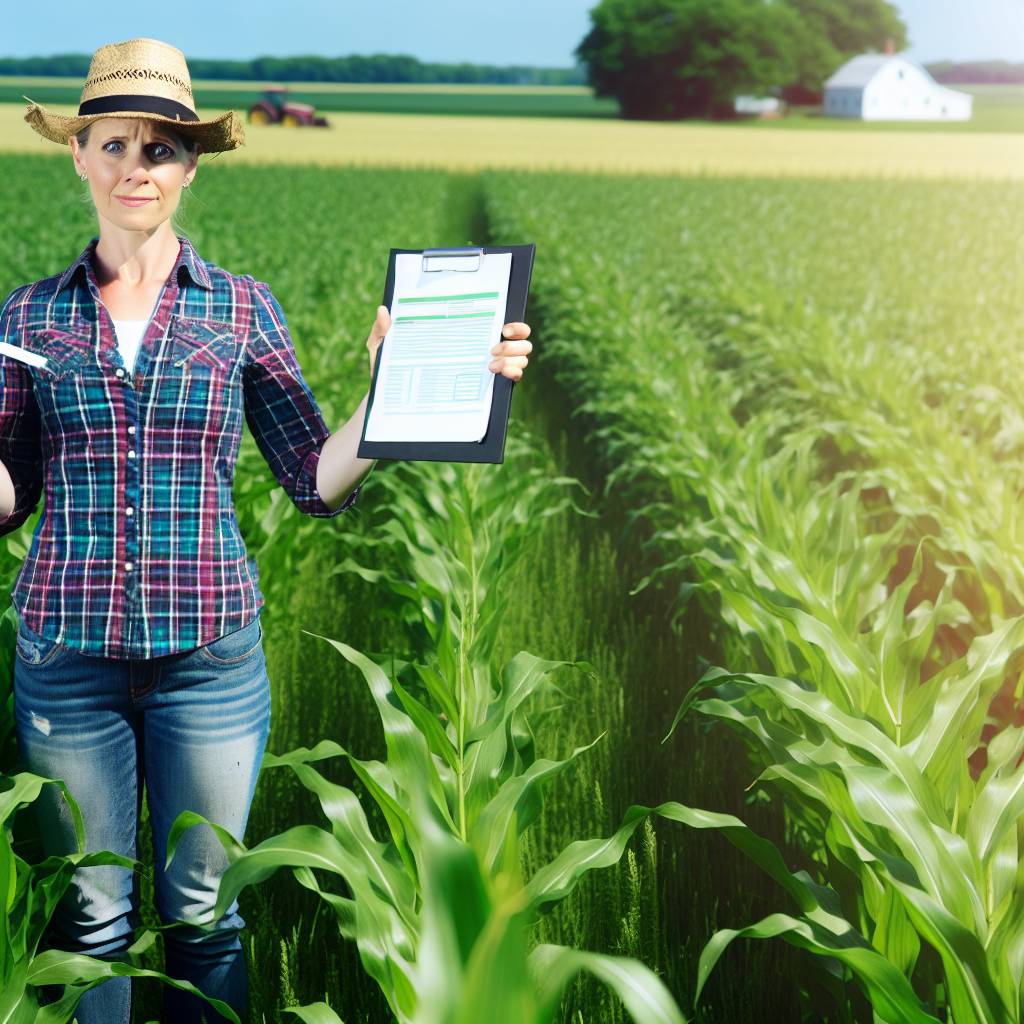
Challenges and Barriers to Integrating Precision Agriculture into Traditional Real Estate Models
Understanding Precision Agriculture
Precision agriculture uses technology to monitor and manage crop production efficiently.
This method relies on data analysis to improve yield and reduce waste.
However, fully integrating it into real estate practices poses significant challenges.
Technological Limitations
Many real estate professionals lack the necessary technology for precision agriculture.
High costs associated with modern farming equipment can deter investments.
Additionally, outdated systems do not support the data-driven approach required.
Knowledge Gaps
There is often a disconnect between real estate developers and agricultural experts.
Showcase Your Farming Business
Publish your professional farming services profile on our blog for a one-time fee of $200 and reach a dedicated audience of farmers and agribusiness owners.
Publish Your ProfileThis knowledge gap leads to inefficiencies in implementing precision methods.
Furthermore, training programs for real estate agents focusing on agriculture are scarce.
Financial Concerns
Integrating precision agriculture into real estate can be financially risky.
Investors may hesitate due to uncertain returns on agricultural ventures.
Moreover, traditional financing models fail to support innovative agricultural initiatives.
Regulatory Challenges
Compliance with agricultural regulations can complicate real estate transactions.
Different jurisdictions have varying policies affecting agricultural land use.
Additionally, obtaining permits for new technologies can be time-consuming.
Cultural Resistance
Many real estate stakeholders are reluctant to change established practices.
This cultural resistance can slow the adoption of precision agriculture techniques.
However, increasing awareness of sustainability may shift attitudes over time.
Learn More: Essential Greenhouse Construction Tips For Emerging Farmland Investors
Future Trends
Integration of Technology in Real Estate
Innovations in real estate are transforming crop management strategies.
Advanced technologies are enhancing land assessment processes.
For instance, drone technology allows for detailed aerial imagery.
This imagery assists in monitoring crop health and soil conditions.
Moreover, real estate companies are adopting satellite imagery for larger areas.
This transition offers farmers vital data to boost productivity.
Data-Driven Decision Making
Data analytics are revolutionizing how farmers manage crops.
Real estate firms utilize big data to assess land value and real-time market trends.
Consequently, farmers can make informed decisions based on accurate data.
Predictive analytics will soon forecast crop yields using historical data.
This approach helps farmers maximize their resources effectively.
Smart Agriculture Practices
Smart agriculture merges technology and farming for better outcomes.
Real estate innovation enables the development of smart farming equipment.
For example, sensors help monitor environmental conditions continuously.
This information provides farmers with timely alerts for necessary actions.
Automating irrigation systems conserves water and improves crop health.
Sustainable Land Use Management
Real estate enhances sustainable land management practices.
Collaboration between real estate developers and farmers promotes eco-friendly solutions.
Implementing green infrastructure will improve soil health and biodiversity.
Such initiatives foster a balance between urban expansion and agriculture.
Collaboration Between Sectors
Partnerships between agricultural experts and real estate professionals are essential.
These collaborations develop comprehensive land management programs.
Sharing knowledge leads to innovative farming solutions.
Additionally, joint ventures can improve resource allocation for crop management.
Policy Recommendations for Stakeholders in Agriculture and Real Estate Sectors
Enhancing Collaboration
Stakeholders should prioritize partnerships between agriculture and real estate sectors.
Collaboration can lead to shared resources and data for better crop management.
Regular meetings between farmers and real estate developers will foster mutual understanding.
Utilizing Technology
Investing in precision agriculture technologies is crucial for efficiency.
Showcase Your Farming Business
Publish your professional farming services profile on our blog for a one-time fee of $200 and reach a dedicated audience of farmers and agribusiness owners.
Publish Your ProfileReal estate developers can support farmers by integrating smart technologies into land use.
Moreover, data analytics can significantly enhance decision-making processes.
Encouraging Sustainable Practices
Both sectors should endorse sustainable farming and land development practices.
Implementing eco-friendly strategies will benefit crop yields and property values.
Additionally, educational programs can raise awareness about sustainable practices.
Regulatory Frameworks
Develop clear policies that facilitate cooperation between agriculture and real estate.
Policies should encourage land use planning that supports agricultural viability.
Moreover, streamlined permitting processes can enhance project approvals.
Financial Incentives
Offer tax incentives for sustainable agricultural practices and eco-friendly developments.
Such incentives will encourage investment in sustainable technologies and practices.
Furthermore, financial support can help small farmers adapt to new methodologies.
Community Engagement
Encourage community involvement in agricultural initiatives.
Local workshops can strengthen relationships between farmers and residents.
Moreover, engaging the community can promote awareness and participation in crop management.
Additional Resources
Revolutionizing Crop Science: Farmonaut’s Insights on Agricultural …
Enhancing smart farming through the applications of Agriculture 4.0 …

